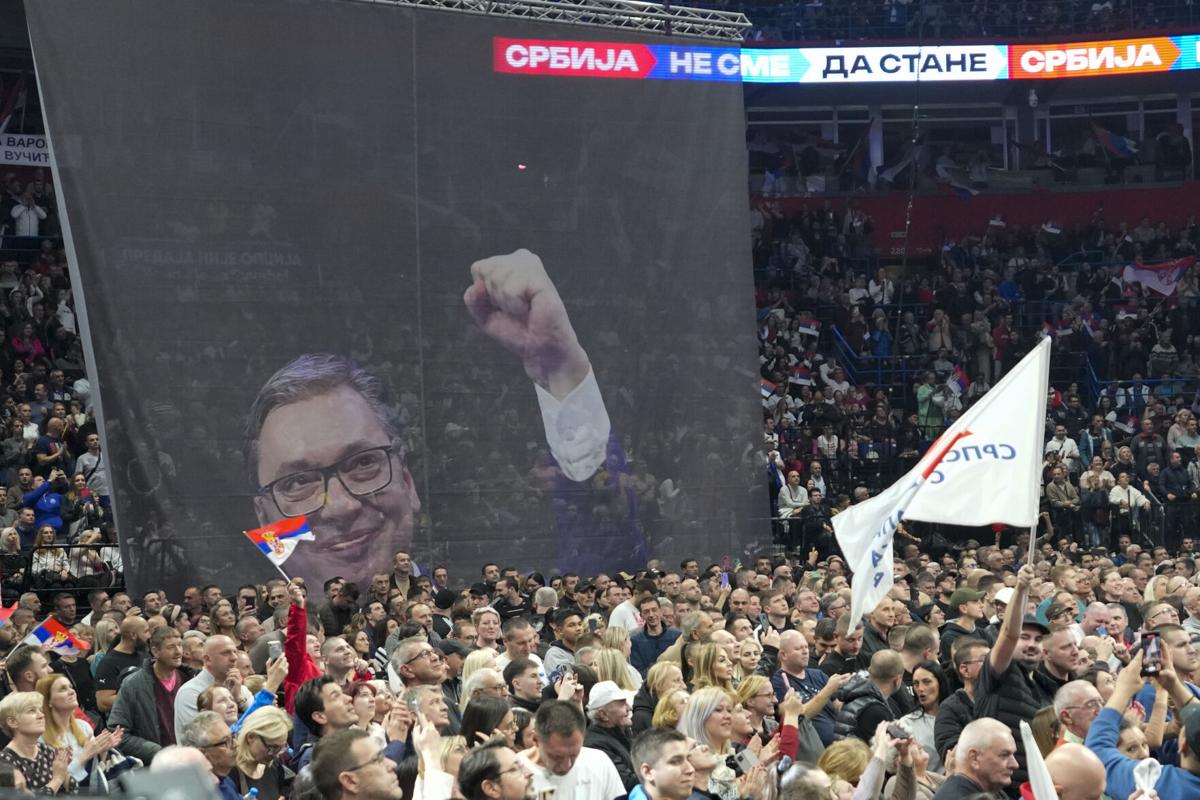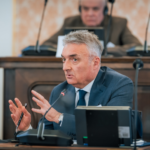In the previous article dated November 8, we reported that the campaign for parliamentary and local elections has kicked off in Serbia. At that time, four parties had submitted their candidate lists to the Republican Election Commission (RCC).
On November 26, the REC completed the registration of candidates – 18 lists from parties, blocs, and movements have been accepted and approved by the Commission on December 2, two weeks before the election date, December 17.
Eighteen parties are fighting for seats in the People’s Assembly of Serbia. They are very different and “variegated” – from communists to extreme radicals promoting Greater Serbia, from liberals to conservatives and monarchists, from supporters of Euro-Atlantic integration to outspoken Russia allies.
So, we continue with a brief review of the participants in the election race. At the same time, we should note that there are no major differences between these actors on domestic issues – almost all of them advocate improving the quality of life, creating new jobs, increasing salaries and pensions, reforming the education and health care systems, ensuring the safety of every citizen, and so on.
Heavyweight leaders. We already talked about three blocs from the said group in the previous piece. These are blocs led by Aleksandar Vucic (92,637 signatures), the one led by Ivica Dacic (almost 20,000) and Zavetniki-Dveri (12,368).
Among them is also the People’s Party – Faithful Choice. Serious People (Narodna stranka – Siguran izbor. Ozbiljni ljudi), headed by Vuk Jeremić, former Minister of Foreign Affairs. Its foreign policy goals address the request of the majority of the population and the country’s politicians – “Kosovo is Serbia”, rejection of the latest proposals for the settlement of the Kosovo issue, and “no” to Russia sanctions. Jeremić is diffirent from competitors by defending the idea of military and political neutrality of Serbia – we (Serbia) are neither for NATO nor for Russia. At the same time, he proposes that the nation restore general military conscription. Jeremić also believes that it is feasible to review relations with the EU and join the European Economic Area instead of pursuing European integration. In the fight for voters, Jeremić actively exploits populist slogans regarding the prohibition of lithium mining, which allegedly poses a threat to people’s health.
We talked about the pro-European movement Serbia without Violence (Srbija protiv vylazni) even before it was registered for the election. Not only the author of the piece but also many political scholars expected a larger number of signatures under their list of candidates for the Assembly. However, they were able to gather only about 20,000 people, although sometimes there were several times more participants in individual rallies. It’s not too little, but it is still not enough to form even a technical government with the help of opposition parties that favor a change of power circles. Different approaches to most issues of domestic and foreign policies expressed by the movement’s participants will definitely be a hindrance. Promises to fulfill all the demands of protesters from which the bloc developed can bring them additional votes. But there are doubts whether this will be enough to defeat Vucic and his allies. Therefore, the members of the bloc face not only the task of winning the election, but also overcoming internal contradictions and preserving post-election unity.
“Second line” parties. These parties have barely collected the necessary 10,000 signatures for the lists of candidates, a minimum threshold for participation, but they face a tough fight for mandates. These include: “We are the voice of the people” (Mi glas iz naroda) by Doctor Branimir Nestorovic; “It must be different” (Mora dyno) by Cedomir Jovanovic; the bloc formed of several parties “Serbia in the West” (Srbija na zapadu), whose electoral list is headed by Vladimir Kovacevic; “Serbian Radical Party” (Srpska radikalna stranka) by V. Seselj, which we have already talked about; the coalition of three parties “Good morning, Serbia” (Dobro jutro Srbijo) under the leadership of Saša Radulović; and the coalition of two parties “Hope for Serbia” (Nada za Srbija), led by Miloš Jovanović.
The leader of “We are the voice of the people”, B. Nestorovic, an openly pro-Russian politician, was nominated by a group of citizens who oppose EU membership, recognition of Kosovo’s independence, and introduction of Russia sanctions. He tends to believe in the existence of parallel worlds, black holes, and portals to other dimensions.
“It Must Be Different” and “Serbia in the West” are pro-European forces who advocate Serbia’s membership in the EU, normalization of relations with Kosovo, harmonization of the country’s foreign and security policy with EU requirements, and joining Russia sanctions. As for the “Voice” organization, a member of the bloc, there are hopes to soon see Serbia in NATO. C. Jovanovic, after the start of Russia’s large-scale aggression against Ukraine, said that Belgrade should make a “historical break with the continuity of erroneous political decisions in maintaining unhealthy relations” (with Russia). Unfortunately, such ideas are not popular in Serbia, where the majority of the population advocates radically opposite positions.
“The Good Morning Serbia” and “Hope for Serbia” coalitions take similar positions on several issues. They express a negative attitude toward the plans of Western nations to help in the settlement of the Kosovo problem, oppose Russia sanctions, defend the territorial integrity of Serbia while preserving Kosovo as part of it, and promote deep decentralization of the country. They have different attitudes to European integration – from mandatory membership in the European Union (former President of Serbia B. Tadic Good morning, Serbia) to proposals to replace membership in the European Union with the development of cooperation with the EU in various fields. Two facts attract attention: 1. Second on the list of candidates of Hope for Serbia is Voislav Mihailovic, the grandson of the leader of the Serbian Cetniks Draža Mihailovic; 2. Movement for the Restoration of the Kingdom of Serbia/Pokret obnove Kraljevine Srbije is also a member of the coalition.
Parties representing national minorities. As we have already said, there are seven of them: “Russian Party” (Ruska stranka) of S. Nikolic; “Bosnian Sandžaka Party of Democratic Action” (SDA Sandžaka), headed by Suleiman Ugljanin; “Bosnian-Croat coalition United in the name of truth” (Ujedinjeni za pravdu) led by Usama Zukorlic and Tomislav Žigmanov; block of representatives of 13 national minorities “Together for the Future and Development”, two Albanian parties – “Political Struggle of Albanians Continues” (Politička borba Albanaca se tetila) bloc under the leadership of Saip Kamberi (four parties) and “Albanian demokratic alternative” (Albanska demokratska alternativa), whose electoral list is headed by Visar Mehmeti.
Albanian parties represent Serbian Albanians living in the Preševo Valley in southern Serbia. At the previous elections of 2022, thanks to the leaders of Albania and Kosovo, they agreed to fight together for seats in the Assembly because they have a lot in common, and most importantly – protection of the rights of Albanians in Serbia in the field of education and culture, integration into state institutions, and development of the country’s south. They want not only to single out problems, but also to participate in their solution.
But this time the Albanians are moving in two columns. Mehmeti’s party looks like a pro-government party and does not put forward goals that conflict with Vucic’s interests. But the bloc led by Kamberi may turn into an opposition force after the elections. He recently said that Kosovo is a recognized state and that European integration should be the government’s main foreign policy goal, which will not sit well with many in Serbia. The bloc’s parties also insist not only on the decentralization of Serbia, but also on the creation of autonomy for Albanian municipalities in Serbia, following the example of the Association of Serbian Municipalities in Kosovo.
The bloc of the two Bosniak parties is, to a large extent, typically pro-government. They have their representatives in the Serbian government, support decentralization, advocate for the development of Bosniak and Croat education and culture, and support integration into the European Union. At the same time, Zukorlić defends the special status of Sandzak (a region in Serbia and Montenegro bordering Bosnia and Herzegovina and Kosovo) through the creation of an international region (following the European example) as a result of negotiations between the governments of Serbia and Montenegro. It is certain that such a scenario does not cause any enthusiasm either in Belgrade or in Podgorica. Moreover, he recently stated in an interview with the Politika newspaper that he expects reconciliation between Belgrade and Pristina, as well as Serbia’s membership in the EU and NATO.
The leader of PDD Sandzaka, Ugljanin, whose party is considered opposition, apears more radical. It is, so to speak, a “subsidiary” party of the BiH PDD, which was created by A. Izetbegovic in the early 1990s, existed in Montenegro until 2002, before handing over its legacy to the Bosniak Party. PDD will fight to provide Bosniaks with proportional representation in state bodies and ensure their rights in Serbia. But its main demand is the autonomy of Sandzak, which is not accepted by the Serbian government, and therefore Ugljanin hopes for the “new people” to come to power, who would accept such a scenario.
The “Russian Party” is an openly pro-Moscow force headed by S. Nikolic, a former director of a marriage agency that worked with Russia and Belarus. Two communist parties have joined the force. They promise to protect the rights of the Russian minority in Serbia and develop relations with Russia, pushing Belgrade to join the CSTO.
The “Party of Hungarians of Vojvodina” is one of the forces representing the 250,000 Hungarian minority, the largest in Serbia. An openly pro-government party, which is also supported by Hungarian Prime Minister Viktor Orban and his FIDES party. For example, between 2011 and 2020, it received EUR 12 million from Hungary to support Hungarian media in Serbia. There is nothing special about the party’s program – it is an integral part of Vucic’s power and his relationship with Orban. Fighting against illegal migrants, ensuring European integration of Serbia, and protecting the rights of national minorities.
Finally, “Together for the Future and Development”, is a coalition of 13 national minorities of Serbia – Montenegrins, Vlachs, Roma, Hungarians, Croats, Greeks, Bosniaks, and others. The main goal of the coalition is to protect and ensure the rights of national minorities by creating an appropriate legislative framework and preserving the individuality of each of them. They hope that national diversity will only contribute to the solution of many problems faced by national minorities. Such a coalition was created in Serbia for the first time.
The campaign has entered a decisive phase and the fight is intensifying with each day as the vote nears. The outcome of the election can either leave Serbia in its current state or lead the nation to fundamental changes.



